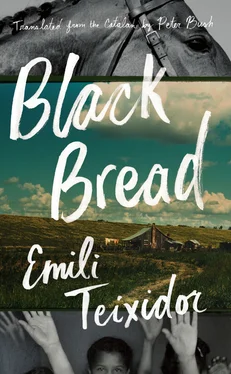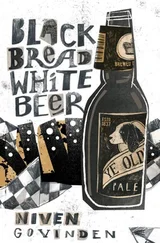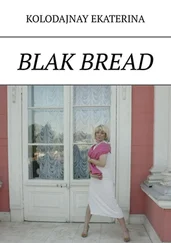Emili Teixidor - Black Bread
Здесь есть возможность читать онлайн «Emili Teixidor - Black Bread» весь текст электронной книги совершенно бесплатно (целиком полную версию без сокращений). В некоторых случаях можно слушать аудио, скачать через торрент в формате fb2 и присутствует краткое содержание. Год выпуска: 2016, Издательство: Biblioasis, Жанр: Современная проза, на английском языке. Описание произведения, (предисловие) а так же отзывы посетителей доступны на портале библиотеки ЛибКат.
- Название:Black Bread
- Автор:
- Издательство:Biblioasis
- Жанр:
- Год:2016
- ISBN:нет данных
- Рейтинг книги:3 / 5. Голосов: 1
-
Избранное:Добавить в избранное
- Отзывы:
-
Ваша оценка:
- 60
- 1
- 2
- 3
- 4
- 5
Black Bread: краткое содержание, описание и аннотация
Предлагаем к чтению аннотацию, описание, краткое содержание или предисловие (зависит от того, что написал сам автор книги «Black Bread»). Если вы не нашли необходимую информацию о книге — напишите в комментариях, мы постараемся отыскать её.
Born in 1933,
's first novel,
, was published to tremendous acclaim in 1988, followed by several more which established him as one of Spain's greatest contemporary authors.
Black Bread — читать онлайн бесплатно полную книгу (весь текст) целиком
Ниже представлен текст книги, разбитый по страницам. Система сохранения места последней прочитанной страницы, позволяет с удобством читать онлайн бесплатно книгу «Black Bread», без необходимости каждый раз заново искать на чём Вы остановились. Поставьте закладку, и сможете в любой момент перейти на страницу, на которой закончили чтение.
Интервал:
Закладка:
She went out into the passage and looked at me while I strutted in my new trousers like a preening peacock.
“And the same goes for you,” she said. “No sad or sour looks. I’ve already killed a rabbit and afterwards I’ll make rice with peas that will make you lick your lips. You’ll have a banquet, like the best of them. Don’t let them see us looking sad; your father wouldn’t like that. Head held high, because we’ve never hurt a soul. They are the fascists.”
Before we left to go the Parish Centre, she cast an eye over me from head to toe: white shirt, trouser belt properly tied, clean shoes, socks to within two centimetres of the bottoms of my bloomers, a handkerchief pointing up from my jacket top pocket, a bow tie, a white missal with ivory covers and mementoes in the form of a print with a ring and a Baby Jesus on one side and my name, the date and a prayer on the other.
“That mending tailor has done a good job, guided by Aunt Enriqueta,” Mother nodded approvingly and then tittered to herself: “They’ll never guess where I got that new outfit from! That’ll be one in the eye for the four bigwigs, as Grandmother calls them. Let it be an end to poverty for one day. The person has yet to be born who can keep me down. If we have to perform, then so be it! Off you go, my lad, and hold your head high.”
I could feel the eyes of the whole parish locking on us throughout the ceremony, and Father’s invisible presence, like an empty void not even my mother’s serene defiance could blot out. A kind of ghost, like the huge cross and heart painted on the wall at the back of the stage.
When I tried on my long trousers in our bedroom alongside Quirze, I thought of myself alone, at a loss, in the town’s streets, after mass, because when Mother got home and we had breakfast — a good cup of hot chocolate with the wafer biscuits she’d prepared beforehand — she said she had to get lunch ready, and I should go by myself to pay a visit to friendly families, ones that had helped us or that she reckoned were on her wavelength, together with some who were not so friendly but who now fawned over us as if attempting to apologize for their secret collaboration in our downfall. I should give them all mementoes of my First Communion.
“They know where your father is. They stuck him there,” she said as if trying to raise her own spirits, “Don’t be afraid! Let them see the situation they’ve landed us in, and that we’re not on our knees.”
The other communicants paid these polite visits accompanied by their parents, but I had to call on all my resources and remember my mother’s words so I didn’t go bright red with embarrassment.
I didn’t know what ties my mother had to the families she had me visit: the Querols, with the husband who was a turner at the foundry and always wore his blue overalls and must have been a colleague of my father; the Teco family were pastry-makers in one of the town’s bakeries, and so devout they’d lost three brothers in the war, one of whom was a priest; the young women from Can Triadú, two dowdy spinsters who loved me like a son; the Pratsdesalas, from the grocery store where we always shopped; Tuietes and Carolina, Mother’s workmates on the same shift at the factory, in the same section, on the nonstop machines, the most gruelling work, like the men’s, where you earned the best rates; Ca la Filosa, with Mrs. Dolors whom people nicknamed Napkin Lolita and the kids, Fatibomba, because she was so fat, who always wore black because she was a widow and she owned the town’s smallest factory, a mere ten or twelve workers, a close friend of Mother’s; the neighbours, obviously, the Boixassas and Ferriols, who lived in the top and bottom in our cheap housing…
They all gave me a kind welcome, stared at me, and some even made me spin round so they could see my outfit from every angle, admiring the daring modernity of my plus-fours, though they couldn’t tell whether they were apt or not for a First Communion; they accepted the memento that they stowed away somewhere or other, and most gave me a little something, cèntims or sweets I pocketed, and everyone praised my overall appearance, sent their regards to my mother and congratulated her on the way she’d dolled me up. Whenever they gave me cèntims , I grasped why Mother was so keen on my paying these visits. Mother had acted as if it were Holy Week when she’d tell me and a couple of my friends from town to learn some ditties which we then sang with a small flute accompaniment outside the houses of small farmers who lived on the outskirts and we carried a well-padded basket decorated with ribbons and bows for the eggs, cold sausage and odd small change they gave us. She warned us off joining the parish choir, saying we’d have a much better time by ourselves, we’d get to the farmhouses before the big choir, and would collect more money, because priests gave their choristers nothing, priests were tight-fisted and only took them on an excursion to the coast at Pentecost. So we spent every evening before Holy Week rehearsing these ditties that she invented:
This house’s master
is a very kind fellow,
he’ll fill our basket,
and live for many an Easter.
If the lady of the house came to the door we only had to change master to lady or young man, or son-in-law and the rest didn’t change:
This house’s lady
is a very kind…
In the evening we’d come home with our basket loaded with eggs and sausage and our pockets full of small change. She divided it up and we had a supply of snacks and lunches for a few weeks.
And she did exactly the same on the day of my First Communion, by insisting I call on friends and acquaintances.
“Poor Florència has really made an effort!” they said. “I don’t know how she has managed. You’re turned out like a little model. Congratulations and many happy returns.”
Mrs. Dolors, Napkin Lolita, Fatibomba, was the only one who ignored my clothes and she gave me the most money, a wad, that she told me to put in my pocket, not show anyone, and give to my mother.
Though nobody ever told me, I gathered that the garment the old-fashioned tailor had adapted with Aunt Enriqueta’s help, was one Mrs. Dolors had preserved that used to belong to her dead son, and that’s why it was on the old side, straight out of Little Lord Fauntleroy , said the girls in Can Triadú, a film about a boy they liked a lot and thought very handsome and distinguished, one they’d just shown in the village cinema.
Mother and I had lunch by ourselves, seated at opposite ends of the table.
“It’s better without guests,” she said. “It’s such a lot of work cooking for six or seven! The family can do that; we’re not in a fit state for parties. Isn’t that so, Andreu?”
And she sat there with a spoonful of rice hanging in mid-air, gazing out beyond the balcony windows, and didn’t say another word, as if she’d forgotten she was eating or had lost her appetite.
I imagined the sadness that was overwhelming and paralyzing her but I resisted succumbing. I always thought of the future, of that same afternoon, tomorrow or the day after, when the cheerfulness I associated with cars and mechanics would return, and my father would throw me up in the air like a ball, and catch me with a shout before we collapsed on the bed where we romped, laughed and hugged each other.
Perhaps that was the day when the invisible seed of an idea was planted in my head that grew over the years, though I was quite unaware; namely, that God was about solitude, isolation and silence. God is man’s weak spot, I heard the Saint Camillus Superior remark one day to Grandmother, though I hadn’t a clue what they were talking about. That was why he appeared to us when we most needed him, in sickness, poverty and moments of suffering. I couldn’t remember what Grandmother said, but I was surprised by the friar’s response, as if he was saying that God was like the doctor who came as the last resort, or something similar. Those empty streets when families were eating lunch, my mother’s vacant stare, those endless boring, lethargic afternoons, all that must be God’s way, God’s tortured joy that was sadness on the outside and hid unknown joy inside. Sometimes, when I took communion again with my school, when I still lived in Mother’s town, I shook with fear when approaching the altar, and experienced the same feeling I’d felt that afternoon after my First Communion, fear of a step leading to a mystery that became more alien with every forward step I took, like someone repeating a piece of mischief, who feels a twinge of repentance that he immediately represses so he can relapse again. Once the host was inside me, I felt nothing. I tried to feel things, to hear voices, to speak to somebody, and was overcome by the absurd sense that I could only recognize my own inner voices that were unfolding in a kind of lunacy. Man’s weak spot. The world’s silence, Father Tafalla could have added, as he seemed to know all there was to know about such matters.
Читать дальшеИнтервал:
Закладка:
Похожие книги на «Black Bread»
Представляем Вашему вниманию похожие книги на «Black Bread» списком для выбора. Мы отобрали схожую по названию и смыслу литературу в надежде предоставить читателям больше вариантов отыскать новые, интересные, ещё непрочитанные произведения.
Обсуждение, отзывы о книге «Black Bread» и просто собственные мнения читателей. Оставьте ваши комментарии, напишите, что Вы думаете о произведении, его смысле или главных героях. Укажите что конкретно понравилось, а что нет, и почему Вы так считаете.












